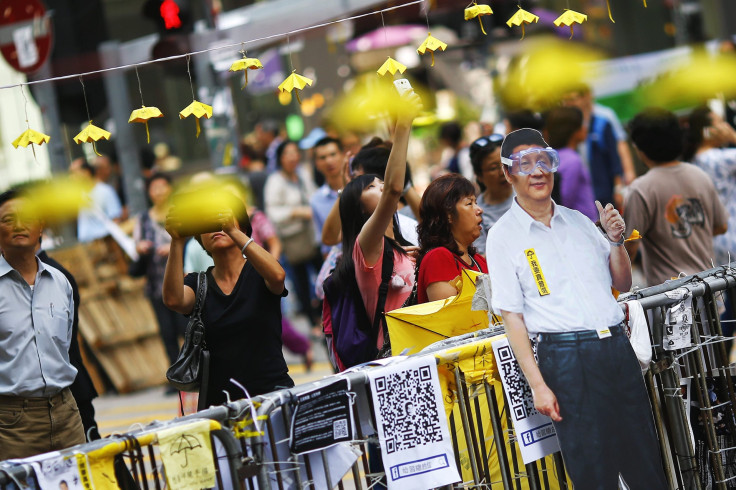Hong Kong Protesters Consider Crashing APEC Summit In Beijing To Push Pro-Democracy Agenda

The leaders of student protest groups in Hong Kong are considering visiting an international summit in Beijing next month to present their case to Chinese officials, according to reports. However, it is possible that delegates from such groups would not be allowed to enter mainland China.
Alex Chow, the general secretary of the Hong Kong Federation of Students, said at a rally in the city late Thursday that protest leaders would discuss the idea of trying to speak to Chinese government officials at the Asia-Pacific Economic Cooperation summit, scheduled to be held in Beijing next month, according to a report from The Associated Press.
Local broadcaster RTHK quoted Chow as saying that if student leaders did make the trip, then it would be up to the Chinese government to demonstrate that it was willing to listen to the concerns of protesters.
Details of the plan, including who and how many representatives should go, and whether there would be a back-up plan if they were refused entry, were still open to discussion, Chow said, according to a report from the South China Morning Post.
"If the representation can enter Beijing successfully, of course we would want to have a dialogue with officials on universal suffrage," he said. "If Beijing officials value the opinion of Hong Kong people, I believe they will talk to students."
Some experts were skeptical as to whether China would allow Hong Kong protest leaders to enter the country for such an important summit.
“If they do let him in, the media battle escalates. There would be costs to keeping him out, but not as high as letting him in,” Sam Crane, a professor of political science at Williams College in Massachusetts, told the Wall Street Journal. “Beijing expends a lot of effort to control narrative within China. That is constant. Were Mr. Chow to personally go to Beijing, that control might slip. Or, at least, the Communist Party would worry that their control of the narrative could slip.”
Regina Ip, a former secretary for security in Hong Kong, said that she thought it would be inappropriate for protest leaders to try and join the summit, according to RTHK.
Chinese authorities have tightened up security ahead of the upcoming APEC summit, which will be attended by leaders of 21 nations, including U.S. President Barack Obama and Japanese Prime Minister Shinzo Abe, according to a report from the Associated Press.
China has in the past denied entry to Hong Kong figures whose views it finds unpalatable. Leung Kwok-heung, a perceived radical member of Hong Kong's Legislative Council, known locally as “Long Hair,” was denied entry to Shanghai in April 2014. Leung was to attend a meeting of Hong Kong's pan-democrat lawmakers and Chinese officials on political reform.
He was turned back, according to RTHK, after officials discovered that he was carrying letters calling for the vindication of protest leaders in the 1989 Tiananmen Square movement, a subject so taboo in China that the word “Tiananmen” is almost never uttered on Chinese television.
© Copyright IBTimes 2025. All rights reserved.






















